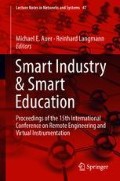Abstract
The first generation of affordable consumer virtual reality headsets and related peripherals are now available. Question-Answering (QA) systems and speech recognition/synthesis has improved dramatically over the last decade. Virtual assistants, based on speech-based services are growing in popularity and can be used in a range of diverse application areas. This paper explores the practical use of virtual reality, IOT and voice driven virtual assistants in remote laboratories to facilitate visualization of electrical phenomena and to tutor students; guiding them through each stage of an experiment; presenting supplementary teaching resources when requested; accessing, controlling and configuring instrumentation and hardware and providing feedback with summative and formative assessment. The re-purposing of existing teaching material for use in an immersive environment with a virtual assistant is shown and the limitations and opportunities offered by the approach taken and the technologies used are discussed. The process of integrating test instrumentation, the board under test, a switching matrix and additional teaching resources into virtual reality using IOT with the inclusion of virtual assistants is described. Two case studies of practical working examples of remote laboratories in virtual reality with a virtual assistant tutor are demonstrated and the viability and long-term opportunities for the use of virtual reality and virtual assistants in the context discussed.
Access this chapter
Tax calculation will be finalised at checkout
Purchases are for personal use only
References
De Floriani, L., Schmalstieg, D.: IEEE Tran. Visual. Comput. Graph. 23(4), v–v (2017). IEEE Virtual Reality 2017 Special Issue
Bouziane, A., Bouchiha, V., Doumi, N., Malki, M.: Question answering systems: survey and trends. Procedia Comput. Sci. 73, 366–375 (2015) ISSN: 1877-0509
Khillare, S.A., Pundge, A.M., Mahender, N.C.: Question answering system, approaches and techniques. Int. J. Comput. Appl. 141(3), 34–39 (2016)
Microsoft. 2017 Cortana Intelligence services. https://azure.microsoft.com/en-gb/overview/cortana-intelligence. Accessed 03 Dec 2017
Halimi, W., Salzmann, C., Jamkojian, H., Gillet, D.: Enabling the automatic generation of user interfaces for remote laboratories. In: Auer, M., Zutin, D. (eds.) Online Engineering & Internet of Things. Lecture Notes in Networks and Systems, vol 22. Springer, Cham (2018)
Cortana Intelligence. https://www.microsoft.com/en-gb/cloud-platform/what-is-cortana-intelligence. Accessed 03 Dec 2017
Lindsay, E., Liu, D., Murray, S., Lowe, D.: Remote laboratories in engineering education: students’ perceptions. In: Proceedings of the 18th Australian Association for Engineering Education (AaeE 2007) (2007)
Lowe, D., Murray, S., Lindsay, E., Liu, D.: Evolving remote laboratory architectures to leverage emerging internet technologies. IEEE Trans. Learn. Technol. 2(4), 289–294 (2009). https://doi.org/10.1109/tlt.2009.33
Connect Raspberry Pi to Azure IoT Hub. https://docs.microsoft.com/en-us/azure/iot-hub/iot-hub-raspberry-pi-kit-node-get-started. Accessed 03 Dec 2017
Callaghan, M.J., Harkin, J., Prasad, G., McGinnity, T.M., Maguire, L.P.: Integrated architecture for remote experimentation. In: International Conference on Systems, Man and Cybernetics, vol. 5, pp. 4822–4827. IEEE (2003). https://doi.org/10.1109/icsmc.2003.1245746
Callaghan, M.J., Harkin, J.G., Scibilia, G., Sanfilippo, F., McCusker, K., Wilson, S.: Experiential based learning in 3D virtual worlds: visualization and data integration in second life. In: Remote Engineering and Virtual Instrumentation (REV 2008) Conference, Dusseldorf, Germany (2008)
Cognigy AI. https://www.cognigy.com/. Accessed 03 Dec 2017
Author information
Authors and Affiliations
Corresponding author
Editor information
Editors and Affiliations
Rights and permissions
Copyright information
© 2019 Springer International Publishing AG, part of Springer Nature
About this paper
Cite this paper
Callaghan, M.J. et al. (2019). Voice Driven Virtual Assistant Tutor in Virtual Reality for Electronic Engineering Remote Laboratories. In: Auer, M., Langmann, R. (eds) Smart Industry & Smart Education. REV 2018. Lecture Notes in Networks and Systems, vol 47. Springer, Cham. https://doi.org/10.1007/978-3-319-95678-7_63
Download citation
DOI: https://doi.org/10.1007/978-3-319-95678-7_63
Published:
Publisher Name: Springer, Cham
Print ISBN: 978-3-319-95677-0
Online ISBN: 978-3-319-95678-7
eBook Packages: Intelligent Technologies and RoboticsIntelligent Technologies and Robotics (R0)

